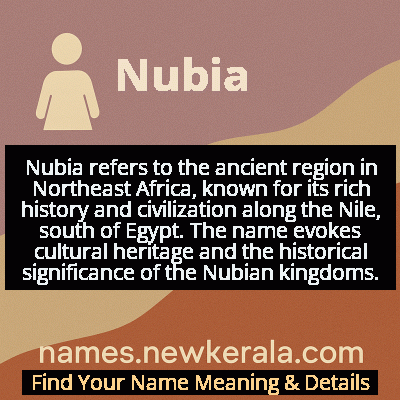Nubia Name Meaning & Details
Origin, Popularity, Numerology Analysis & Name Meaning of Nubia
Discover the origin, meaning, and cultural significance of the name NUBIA. Delve into its historical roots and explore the lasting impact it has had on communities and traditions.
Name
Nubia
Gender
Female
Origin
Egyptian
Lucky Number
2
Meaning of the Name - Nubia
Nubia refers to the ancient region in Northeast Africa, known for its rich history and civilization along the Nile, south of Egypt. The name evokes cultural heritage and the historical significance of the Nubian kingdoms.
Nubia - Complete Numerology Analysis
Your Numerology Number
Based on Pythagorean Numerology System
Ruling Planet
Moon
Positive Nature
Diplomatic, friendly, artistic, empathetic.
Negative Traits
Over-sensitive, moody, indecisive, prone to self-pity.
Lucky Colours
Green, cream, white.
Lucky Days
Monday.
Lucky Stones
Pearl, moonstone.
Harmony Numbers
1, 3, 4.
Best Suited Professions
Diplomats, mediators, caregivers, artists.
What People Like About You
Cooperative spirit, friendliness, artistic talent.
Famous People Named Nubia
Nubia Bento Nascimento
Brazilian singer and actress
Known for her powerful vocals and representation of Afro-Brazilian culture in music
Nubia Muñoz
Colombian medical researcher
Nominated for Nobel Prize for her work linking HPV to cervical cancer
Nubia Bautista
Colombian psychiatrist
Mental Health Director at Colombian Ministry of Health, mental health policy reformer
Nubia Baggio
Italian actress
Known for roles in Italian cinema and television series
Name Variations & International Equivalents
Click on blue names to explore their detailed meanings. Gray names with will be available soon.
Cultural & Historical Significance
Nubian culture produced powerful queens and warrior kings who ruled the Kingdom of Kush, with notable figures like Queen Amanirenas famously resisting Roman occupation. The name embodies African heritage, resilience, and cultural pride, representing a civilization that maintained its distinct identity despite external pressures. In modern contexts, the name has been reclaimed as a symbol of Black heritage and African diaspora identity, connecting contemporary bearers to a rich historical legacy of African achievement and sovereignty.
The cultural significance extends beyond historical references to contemporary movements celebrating African identity. During the 20th century, the name gained prominence as part of cultural reclamation efforts, serving as a counter-narrative to colonial histories that often marginalized African civilizations. Today, Nubia represents not just a geographical region but a symbol of African excellence, cultural continuity, and the ongoing project of decolonizing historical narratives.
Extended Personality Analysis
Individuals named Nubia are often perceived as possessing a regal and confident demeanor, reflecting the name's royal historical connections. They typically exhibit strong leadership qualities, cultural awareness, and a deep sense of heritage. Nubias are frequently described as resilient and determined, able to overcome challenges with grace and strength—qualities that mirror the historical Nubian civilization's ability to maintain its identity through centuries of change.
These individuals often demonstrate artistic sensitivity, intellectual curiosity, and a natural magnetism that draws others to them. They tend to be protective of their loved ones and passionate about social justice, particularly regarding cultural preservation and representation. The name suggests someone who is both grounded in tradition and forward-thinking, balancing respect for heritage with modern innovation. Nubias are typically seen as warm yet authoritative figures who command respect through their integrity and cultural pride rather than aggression or dominance.
In social settings, Nubias often become cultural ambassadors, naturally educating others about history and heritage while building bridges between communities. They possess an innate dignity that makes them natural leaders in both professional and personal contexts. Their combination of historical consciousness and contemporary awareness makes them particularly effective in roles requiring cultural sensitivity, education, or community organizing. The personality traits associated with Nubia reflect the civilization's legacy: enduring strength, cultural richness, and the ability to thrive while maintaining core identity.
Modern Usage & Popularity
In contemporary naming practices, Nubia has experienced a resurgence as parents seek names with cultural significance and African heritage. The name gained popularity during the Black Pride movement of the 1960s-70s and has maintained steady usage, particularly in African American and Afro-Latino communities. According to Social Security Administration data, Nubia has ranked consistently in the top 2000 names in the United States since the 1990s, with notable increases during cultural movements celebrating Black identity. The name is particularly popular in Brazil, where it honors African roots, and among diaspora communities reconnecting with pre-colonial African history. Modern usage reflects a conscious choice to celebrate African civilization beyond Egyptian narratives, emphasizing Nubia's independent cultural achievements and resistance to colonization. The name appears across various media, from literature to music, and continues to gain traction as educational resources about Nubian history become more accessible worldwide.
Symbolic & Spiritual Meanings
Symbolically, Nubia represents gold, wealth, and cultural richness—both literal and metaphorical. The ancient Nubian region was famous for its gold mines, making the name synonymous with preciousness and value. Metaphorically, it symbolizes cultural wealth, heritage preservation, and the enduring strength of African civilizations. The name carries connotations of royalty and sovereignty, referencing the powerful Nubian kingdoms that rivaled ancient Egypt. It also symbolizes resilience and cultural continuity, as Nubian civilization maintained its distinct identity through multiple foreign dominations. In contemporary symbolic usage, Nubia represents pan-African unity, diaspora connections, and the reclamation of African history from colonial narratives. The name embodies the concept of 'Sankofa'—looking back to move forward—by honoring ancient wisdom while progressing toward future achievements. Additionally, Nubia symbolizes the Nile River's life-giving properties, representing fertility, sustenance, and the flow of cultural knowledge across generations. The symbolic meanings collectively paint Nubia as representing not just a historical civilization but ongoing cultural vitality and African excellence.

